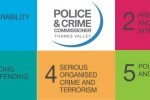
Most people see serious organised crime as the subject of television drama. Quite exciting, fun to watch, a bit of a distraction from reality. Even when we do acknowledge it in the real world it is a phenomenon experienced in the big cities: London, Manchester, Liverpool and Birmingham. It’s not an issue here in places like Thames Valley is it? One of the greatest dangers of serious organised crime, and the challenges in tackling it, is a failure to recognise the reality of the problem in front of us.
The recently appointed Security Minister, Brandon Lewis, has launched a review of the Government’s strategy for tackling serious organised crime. I welcome this review - led by Sir Craig Mackey QPM, former Deputy Commissioner at the Met - as an opportunity to get the balance right between local, regional and national resources.
Serious Organised Crime, or “SOC” as it is known in policing, can take many forms from drug dealing to people trafficking, and money laundering to traditional acquisitive crime. The definition of SOC given by the Crown Prosecution Service is planned and coordinated criminal behaviour by people working together on a continuing basis.The response from the criminal justice system needs to be similarly planned and coordinated.
The Government has established a network of regional organised crime units across the country to assist in the fight against this growing threat. The South East Regional Organised Crime Unit (SEROCU) is led by Thames Valley and also covers Surrey, Sussex and Hampshire. It is one of the leading units in the country with significant skills and capabilities in fraud, cyber and surveillance. They work closely with the National Crime Agency and other arms of the state such as HMRC and the UK Border Force. I would not for one moment question the vital work these organisations do, and without them the fight against serious organised crime would be impossible, but the description I have just given does add to that impression that SOC is a thing that happens “over there”. It is the “sexy” end of crime, that happens only happens in the big cities.
The truth, as always, is much more complex. The phenomenon of “County Lines” drug gangs is a prime example of this. In suburban and rural areas we are seeing the spread of increasingly sophisticated drug dealers. Taking advantage of social media and exploiting children to transport drugs and cash. This is part of a highly developed business model and clearly falls into any sensible definition of serious organised crime. It undoubtedly needs those national and regional resources in order to tackle this threat, but as it the tentacles of these gangs reach into our towns and villages, we can only defeat them through coordinated work with local police forces.
County lines drugs gangs are an easy example of this, but there are many more less obvious ones. That string of bicycle thefts in your area could just be opportunistic thieves taking advantage of the increasing value of most bikes. Alternatively it could be a coordinated plan, with those actually stealing the bicycles paid with a small amount of Class A drugs, whilst the bikes themselves are broken down and either exported or sold online. A spate of burglaries may well be a local criminal taking advantage of dark nights, or it could be the efforts of a gang working with criminals inside the insurance industry to target individual properties.
My point is not to terrify the reader that we are all about to become victims of a mastermind criminal gang, but to understand that much of the crime that we do see may be part of a bigger picture. Whilst the Government has rightly made significant investment in tackling this threat, with the creation of the National Crime Agency itself just six years ago, it is vital that the review by Sir Craig Mackey does not overlook the importance of local neighbourhood policing.
Not only is neighbourhood policing a good in its own right and the bedrock of policing in the UK, it is also the eyes and ears on the ground, the trusted figure that the public will talk to. It is a common complaint to bemoan that we no longer know our local police officer, but as someone who goes out on patrol with officers regular I never cease to be amazed about how well Constables and PCSO know their community. They know the “characters” and the criminals, they pick up a huge amount of intelligence and of course they are on the front line of enforcement and dealing with the impacts of serious organised crime.
As criminals make more use of technology we must always ensure that law enforcement agencies keep pace. Much of this will inevitably be best provided at a national and regional level - the criminals after all do not respect borders. However we must never lose sight of the fact for as long as criminal gangs have a local impact they also require a local response.
The arrest of a “local” drug dealer may not kill the beast but if it cuts off one of its tentacles and disrupts the gang then it protects local children and helps us fight the gang as a whole. Brandon Lewis is right to launch this review, which is expected to report early next year. The strategy that comes out of it needs to be as coordinated as the criminal gangs we are seeking to stop.



